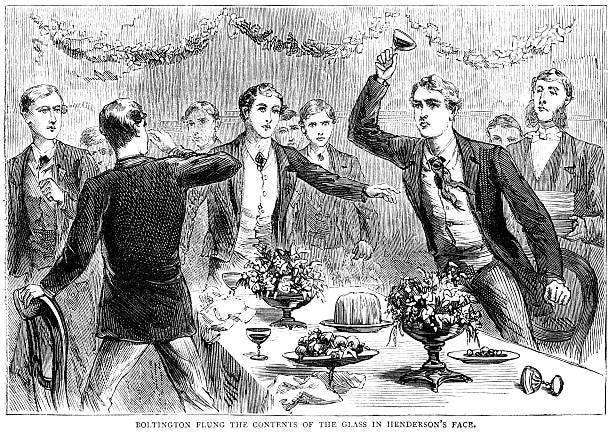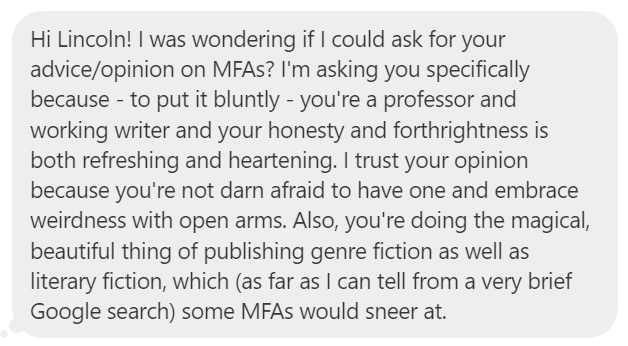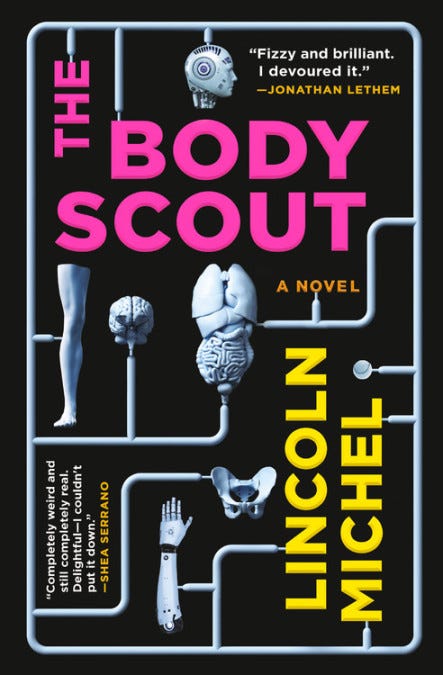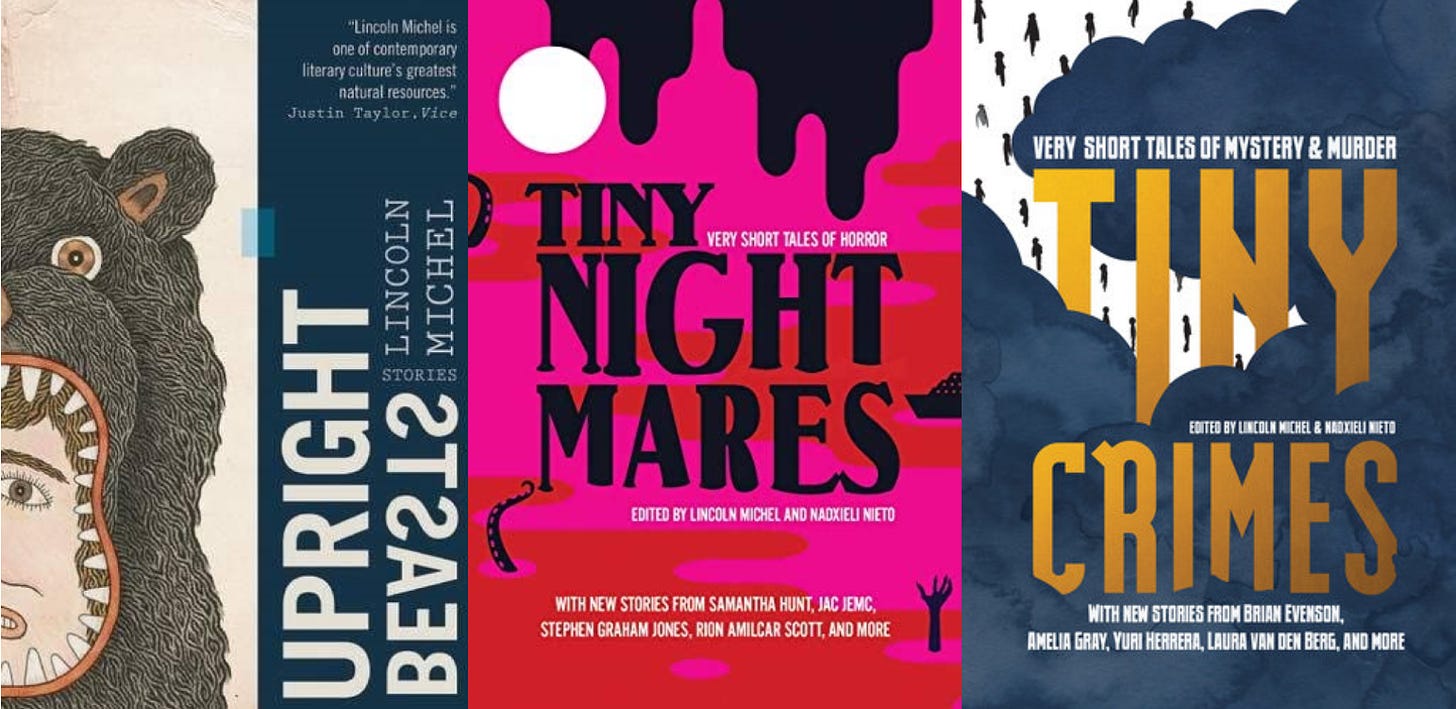Recently, I got a Substack DM with a question about MFA programs. I thought I’d answer it publicly because A) I’ve been thinking about doing a regular Counter Craft “advice column” type thing—so if you have a question, ask—and B) I’ve been meaning to write about MFA programs because the discourse around them gets a bit ridiculous. Occasionally, you hear one “needs an MFA” to be a serious writer. More often, you hear that MFA programs are a powerful Illuminati that controls what gets published and turns all students into cookie cutter clones who can only write in “MFA style” with all their originality, vitality, and style drained away. All of this is silly.
Before I got off on a tangential rant, here’s the question (which I got permission to share):
What MFA Programs Are
First, I’ll answer the genre question and say MFA programs—following the lead of the larger literary culture—has shifted radically on this front. 20 years ago, MFA programs and the general “literary fiction” culture was pretty hostile to genre fiction. But these days, many programs are genre friendly. I personally have taught speculative fiction classes at multiple MFA programs. You might get the occasional professor who is still a realist snob but its hard to hold that attitude when writers like Kelly Link, Colson Whitehead, N.K. Jemisin, Charles Yu, and countless others are winning MacArthurs, Pulitzers, and NBAs. I do think many programs are behind the times on hiring professors who are conversant in genre—anyone want to give me a tenure track job?😭—but programs are generally more open these days. My advice there is to simply look at the faculty when applying.
What about MFAs in general? MFAs can be a really useful thing if they fit your temperament and goals. I had a great time in mine. I wrote a lot, read authors I hadn’t heard of, and made lifelong friends some of whom I still trade work with. Yes, I learned practical advice on craft and the publishing business. But mostly I gave myself dedicated time and space to take writing seriously with other people who took it seriously. This meant a lot to me, as I was at the time living in a small town in Virginia with zero friends who cared about writing. (This was nearly 20 years ago, so online literary communities were sparse.)
Some people won’t thrive in MFAs. Some writers may find taking classes with perhaps competitive peers stifling. Or they simply can’t usefully fit them into their lives for whatever reason. If you don’t want to get an MFA, you absolutely do not have to. Many writers in all genres are published without an MFA degree. Similarly, countless degree holders never publish a book. Getting or not getting an MFA is not going to determine your publishing career.
Maybe it’s useful to strip back the layers of heated rhetoric and look at what an MFA is at its core. It’s a few years of studying and producing creative writing with a group of peers and professors who take writing seriously. You are normally taking two or three classes a semester (although it can be more or less depending on the program). You get regular deadlines, practice editing, and a writing community with readings and lectures and such. Maybe you get some contact with industry professionals or useful experience teaching or editing a literary magazine. That’s the gist.
Does that sound appealing to you? If so, you can probably find an MFA that fits your temperament. There are tiny programs and huge ones. Programs in small towns and large cities. “Low res” MFAs that are done mostly remotely and full residency programs. And there’s everything in between. Focus on the location, size, faculty, and finance. Programs range from expensive to cheap to literally paying you to come. (Typically, this is by having you teach undergrad classes which doubles as teaching experience.) It’s good advice to not go into debt for an arts degree. Beyond that, it depends on your own finances and the specifics of the program.
If you’re not interested in or unable to attend an MFA, you can cobble together most of what they provide on your own. You can form a local (or online) writing group to get feedback and deadlines. You can watch lectures, read craft books, attend readings, volunteer at lit mags, and curate your own diverse collection of readings. The only thing an MFA can provide that you can’t do on your own is a terminal degree that allows you to teach.
This doesn’t mean MFAs are useless by any means. One can do all these things, but most aspiring writers don’t. It can be hard to find and maintain a writing group. Life and cellphones get in the way of self-imposed deadlines and reading. Etc. But the point is that MFA programs are not mandatory or magical.
What MFAs Aren’t
Here I’m going to stray from the question to rant a bit about the aforementioned popular claims that MFA programs control the publishing world, produce “MFA style” clones, and suck out all the originality of young writers. I get why this is popular. All art fields are precarious and unfair. Success is mostly luck or connections. Great books fail to sell. Awful books become bestsellers. If you’re a struggling writer, it’s comforting to have a boogie man like “MFAs” that you can blame for all your frustrations with contemporary publishing. But that doesn’t mean it is true.
Trade publishing is a business. Publishers make lots of mistakes but ultimately they are trying to make money by selling books that people want to buy. This is especially true if we’re talking about the big corporate publishers that dominate the market. They do not care what is currently popular in MFA programs nor are they really paying attention to them. If publishers cared about pushing “MFA fiction,” then they’d buy a lot more short story collections! I’ve always thought that the discourse gets the relationship backwards. It is not that big publishers follow the tastes of MFA programs as much as emerging writers—with or without MFAs—follow the tastes of publishing.
This is easy to see when it comes to complaints of “MFA style.” What is MFA style? It is invariably whatever is popular in publishing at the moment or else whatever the complainer personally dislikes in publishing. In the 00s, the complaint was that MFA style was whimsical and playful fiction that was popular at the time—Dave Eggers and Jonathan Safran Foer were held up as the avatars of MFA style then, even though neither had an MFA—or else it was plotless, interiority heavy realist fiction. Today, the critique is the exact opposite! Now people complain that MFA style is trauma-focused identity politics and plot-heavy speculative fiction written almost like a screenplay.
I know the kind of books they mean. They’re often popular, award winning, and adapted for TV. But if MFA grads are writing those books, is this because corporate publishers are borrowing the tastes of MFA professors—who often have a difficult time selling their own books—or because those are the kind of books that sell? I would submit that if MFA grads start writing “autofiction” after Ben Lerner gets buzz and speculative fiction after Station Eleven blows up and YA SFF after Hunger Games, that’s because they’re following publishing trends and the cultural zeitgeist. As someone who has read lots of slush, let me promise you that non-MFA holders are following these trends too.
Sure, what students read in MFA programs influences their work and some of that will be published work. But I think people really overrate the influence of MFA programs on individual writers. It’s a few semesters of one’s life. It can be useful! Reading widely and writing regularly is basically always useful. It can speed up your development. But it is unlikely to completely change your aesthetics, interests, and talents. The two years you’re at an MFA program will not outweigh your many years of reading and writing before an MFA program and your lifetime of reading and writing after.
So to sum this all up: Go to an MFA if it appeals to you (and you won’t go into massive debt attending) and don’t if it doesn’t. Otherwise, focus on the most important things for all writers, which are reading widely and writing regularly.
If you like this newsletter, consider subscribing or checking out my recent science fiction novel The Body Scout that The New York Times called “Timeless and original…a wild ride, sad and funny, surreal and intelligent.”
Other works I’ve written or co-edited include Upright Beasts (my story collection), Tiny Nightmares (an anthology of horror fiction), and Tiny Crimes (an anthology of crime fiction).








Graduating next week from Drexel University (Philly) low-residency MFA. We are only the fourth graduating class. I knew I would never write a novel without this discipline (and investing the $$$). It was 50-50 craft and business, with three residencies - including one in NY. One of the electives required that we write and upload 4,500 words a week. And that’s how I wrote an 89,000 word novel that I am now querying and starting to plot out the next one. In the case of low-residency program, you get out of it what you put into it. I wrung every dollar and opportunity out of it.
As a traveller, I looked for a low-residency or online MFA program. I was delighted to find Lindenwood University in St. Charles, MO, and their online MFA in Creative Writing. I've found that the program offers great opportunities to learn and improve my reading, editing, and writing skills - and they offer a 50% grant for students 60+ years of age! Bonus! Students can declare an area of focus, such as fiction, non-fiction, poetry, and YA/MG as well. I highly recommend it.